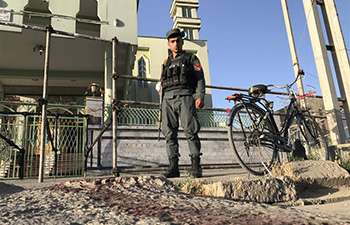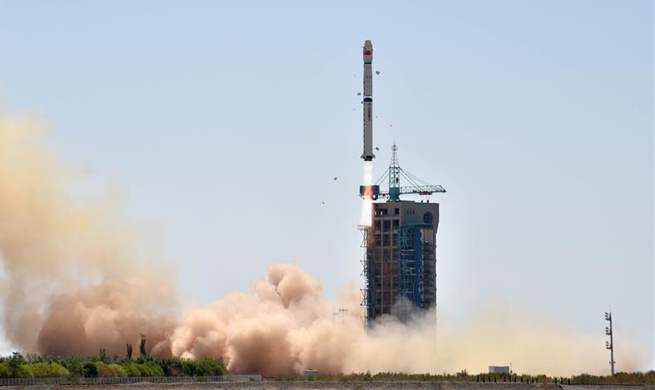BEIJING, June 16 (Xinhua)-- As the U.S. Senate passed almost unanimously new sanctions against Russia on Thursday, the new legislation will possibly fan the flames of an already tumultuous Washington politics and make rapprochement between the former Cold War foes, something President Donald Trump desires, a difficult feat.
The legislation, an amendment to sanctions on Iran, is aimed at restricting Tehran's ballistic missile programs and punishing it for "supporting terrorism."
The Senate, building upon the bipartisan agreement reached earlier this week, backed the legislation with a 98-2 vote. The only two "no" votes were cast by Republican Rand Paul and independent Bernie Sanders, who caucuses with the Democrats.
With regard to Russia, the bill, which includes a mandatory congressional review process to limit Trump's executive power in lifting existing Russia sanctions, is one of the strongest responses from the U.S. Congress to alleged Russian meddling of the 2016 presidential election to date.
The new sanctions are designed to target, among others, "those conducting malicious cyber activity on behalf of the Russian government" and "those doing business with the Russian intelligence and defense sectors," according to a press release by the Senate Committee on Banking, Housing and Urban Affairs.
They also penalize vital sectors of Russia's resource-rich economy, including mining, metals, shipping and railways.
WASHINGTON SHATTERED
The Senate approval came as U.S. Secretary of State Rex Tillerson, the former chief executive officer of oil giant ExxonMobil who received an Order of Friendship from Russian President Vladimir Putin in 2013, asked lawmakers to grand "flexibility" to the White House in dealing with Russia.
Tillerson said during a congressional hearing Wednesday that the Congress should ensure that "any legislation allows the president to have flexibility to adjust sanctions to meet the needs of what is always an evolving diplomatic situation."
The top diplomat is uncommittal to the Russia sanctions package but the Associated Press said Tillerson offered tepid support in light of its passage in the Senate.
He told the House Foreign Affairs Committee he agreed "with the sentiment" among lawmakers that Russia must be held accountable for its meddling in the election, the AP reported Thursday.
Tillerson previously warned the danger of shutting down what he said was "a potentially productive conversation" with Russia, for example, on Syria. He said stepping up sanctions would lead to Russia curtailing progress on Syria.
The legislation is a manifestation of concerted will from both sides of the aisle to have Trump's hands tied when he makes Russia-related decisions. In a unifying sign of the often polarized Congress, the bill, however, could potentially widen the rift between the legislative and executive branches of the U.S. government.
Trump has since his election been engulfed in accusations of -- and now investigations into -- his campaign team's alleged collusion with Russia to tip the election his way.
Former Director of the Federal Bureau of Investigation James Comey, who was fired by Trump, testified under oath before Senate Intelligence Committee on June 8.
Comey said the Trump administration "spread lies, plain and simple" and "defamed" him and the FBI when requesting a halt to the investigation then led by Comey into Russia's interference of the 2016 U.S. presidential election.
Yet, he stopped short in answering whether Trump had obstructed justice, a major concern of the issue that, if confirmed, could see Trump impeached.
In defiance of what Comey had said during the testimony, Trump lashed out on Twitter and called Comey, from whom he reportedly asked for "loyalty" during a January 27 private dinner at the White House, a liar and a "leaker."
After the fallout of Comey's sacking, the U.S. Justice Department appointed Robert Mueller as the special counsel overseeing investigations into the alleged Russian meddling and Trump's possible obstruction of justice.
Trump on Thursday tweeted furiously again, writing in the first of a series of tweets: "You are witnessing the single greatest WITCH HUNT in American political history - led by some very bad and conflicted people! #MAGA."
Trump's ties with Russia have not only overshadowed a range of other political agendas in Washington, but also become a widely discussed topic in a constituency generally not in favor of Trump.
A pub, for example, even devised a bingo game on the day of Comey's testimony and promised to offer free drinks every time Trump sent tweets during the testimony.
RUSSIAN REACTION
In Russia, the other eye of the cyclone, the atmosphere has remained largely calm. The Kremlin spokesman Dmitry Peskov on Wednesday responded to the new sanctions against his country seemingly with grace and poise, saying Moscow wants to get out of the deadlock with its "partners."
"As for the new sanction aspirations of our partners, we wouldn't like to go into this sanction dive once again. But that's not our choice," Peskov said.
Putin, however, took a more sarcastic tone in his comments. Reiterating his denial of Russian hacking into the election, the Russian president pledged to offer Comey political asylum similar to that of former U.S. Central Intelligence Agency contractor Edward Snowden should he be under prosecution.
"What's the difference then between the FBI director and Mr. Snowden?" Putin asked during Thursday's annual call-in with reporters and the general public from inside and outside Russia. "In that case, he's more of a rights campaigner defending a certain position than the security agency chief."
He added that if Comey "faces some sort of persecution in connection with that, we are ready to offer political asylum in Russia to him as well."
At the four-hour marathon event aired on TV and several Russian news portals online, Putin called the Russian meddling allegations a reflection of "exacerbating political infighting" in Washington, while reaffirming Russia's commitment to seeking normalization of ties with the United States. "We don't see America as our enemy," he said.
As for the Russian public, among whom Putin enjoys high approval ratings, it seems a lot of them even don't know who Comey is. They said the United States might have overestimated Russian hackers' abilities.
"I think you just flatter Russia too much, so (in case Russian hackers and the U.S. election) I should be proud of our hackers from Russia," said a Moscow resident to CNN.

















